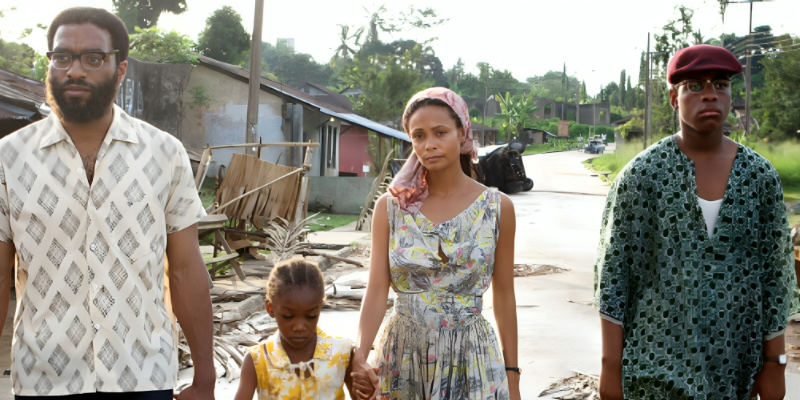The Waiter is an action-drama with political undertones, created by comedian and filmmaker Ayo Makun (AY), who also serves as executive producer. The film is directed by Toka McBaror and unfolds within the walls of Krystal Valley Hotel, where a high-profile governmental event is meant to take place.
The hotel is set to host a major poverty alleviation conference, with the Minister of Welfare and Poverty Alleviation in attendance, alongside delegates from the U.S. and other officials.
However, what was supposed to be a straightforward event soon spirals into a full-blown crisis when a revolutionary group hijacks the hotel in protest against government injustice.
Plot
The story begins with Akpos, a quick-witted but struggling young man who narrowly escapes a “one-chance” robbery. Despite this, he makes his way to work; he’s a waiter at Krystal Valley Hotel. He learns that his mother has been rushed to the hospital and urgently sends money, revealing his desperation and financial instability.
Inside the hotel, preparations are in full swing for a major press conference organised by the Ministry of Welfare and Poverty Alleviation. High-ranking guests are expected, including the Minister herself, Mrs Edet, a party chairman, American delegates, and other dignitaries. Tensions rise among hotel staff as security is tightened, CCTV systems are checked, and the hotel is in lockdown mode to ensure a smooth event.
READ MORE: The Beauty And The Bester Review: A Netflix Documentary Told Too Soon
Akpos is late to work due to the morning’s chaos, and his superior, Idara, threatens to sanction him, not just for tardiness, but for his usual flirtatious behaviour. Akpos tries to sweet-talk his way out of trouble, establishing a playful yet tense dynamic between them.
Meanwhile, the hotel’s Chief Security Officer, Femi, grows uneasy. Although he’s supposed to coordinate with external security, he finds himself sidelined by federal agents who have taken over his post. He’s suspicious, sensing that something is off.
As the event begins, Minister Edet gives a glowing speech about the poverty alleviation scheme, promising relief for small businesses and everyday citizens. Then comes the unexpected: a man in the crowd, Tonye Bright, asks her a pointed question, “Would you stake your life on this scheme working?”
What follows is an explosive turn; the hotel descends into chaos. Tony and his group members of a revolutionary faction have infiltrated the hotel, disarmed the security, jammed all signals, and taken every guest hostage. The hotel is officially on lockdown.
Tonye Bright is no ordinary criminal. He’s a former military man who was betrayed by the very government he served. His family and loved ones have suffered at the hands of systemic corruption. His partner, Nwando, whose family was also displaced by greedy politicians, is part of the group. Together, they plan to redistribute ₦300 billion meant for the poverty scheme directly to Nigerian citizens by siphoning the funds into 6,000 accounts, giving each person ₦1 million.
Nwando was the inside person. She’s been working undercover as the Minister’s secretary and uses her position to access the necessary codes. With a hacker in their team, the money begins to move.
However, cracks begin to form within the revolutionary group. The hacker discovers that Tonye and Nwando secretly diverted ₦100 million into a private Swiss account. Betrayal brews, but before he can expose them, Wando kills him.
While the plan unfolds, Femi and Akpos begin to fight back. Slowly and silently, they start disabling parts of Tonye’s crew from within. Outside the hotel, the Assistant Commissioner of Police is warned not to launch a rescue mission, but in typical fashion, a social media-obsessed police officer tries to go viral instead, sending in a strike team. They’re all wiped out.
Back inside, the situation becomes personal when it’s revealed that Mrs Edet’s husband is one of the key players who orchestrated the betrayal of Tonye years ago. So it’s not just politics, it’s revenge.
In the climax, Nwando is captured by Inspector Zika, while Tonye escapes. However, the ending hints at a sequel: we see law enforcement closing in on Tonye’s location in a remote area, suggesting his time might be running out.
Cast
One thing AY has been known for in Nollywood is star power; he loves big names, and it usually feels like he casts for clout. But this time? He switched things up. The casting for The Waiter was surprisingly solid; every actor earned their spot, not just with name recognition, but with real performance value.
AY, the man himself, played a version of his usual comedic self, but with more range. He wasn’t just there for laughs; his character added emotional grounding to the film. His humour was well-timed, not forced, and gave the film much-needed relief during tense moments.
Then comes Deyemi Okanlawon, and for sure, when it’s action, tension, and presence, Deyemi will show up and show out. As expected, he delivered his role with cool-headed intensity and believability. No overacting, just premium screen presence.

Bucci Franklin and Sunshine Rosman? Please, cast them in more movies together. Their chemistry is too sweet, so organic that it gave depth to their dynamic even without heavy dialogue. Bucci didn’t even need to do too much; he was calm but impactful, a refreshing take compared to the usual hard guy template.
Shaffy Bello as usual, classic. Veteran energy. You already know she brings elegance, poise, and fire to every role, and this was no different. She was commanding and effortlessly believable.
Then, Kunle Remi came in with the comic relief. But it wasn’t slapstick; it was well-woven into the story. His character made you sigh and laugh at the same time, one of those “this guy again? roles that still keep you entertained.
Overall, the cast was not just famous; they were functional. Each one added flavour, intensity, or humour when needed. A well-rounded, diverse ensemble that really understood the assignment.
Language
The movie was a linguistic buffet. Fluent English, Warri Pidgin, Naija street slang. It felt authentically Nigerian. The dialogue was fluid and relatable, not stiff or overly scripted. You could tell the actors were allowed to let some natural flow into their lines, which added to the realism of the film.
Final take
Let’s give credit where it’s due: the cinematography was crisp. Visually, The Waiter delivered clean shots, well-framed scenes, and camera angles that truly complemented the tension and drama of the story. The production team clearly understood the assignment when it came to aesthetics.
Casting? Solid. Everyone showed up and delivered, no deadweight. It was especially refreshing to see a strong ensemble where every character mattered and performances felt earned.
Now, onto the meat of it, the plot. This film is essentially “Robin Hood meets Naija revolution”, and honestly, it was a pretty decent attempt. The idea of redistributing embezzled funds back to everyday Nigerians is always going to hit home, and the storyline managed to hold that tension. It’s arguably one of AY’s strongest productions in terms of story structure and execution.
But let’s talk about the title. The Waiter sounds like the movie is centred around a singular, standout character, Akpos, the actual waiter. But plot-wise, Akpos didn’t necessarily carry the film on his back. If anything, Femi played just as big a role, if not more. The title feels like a red herring, a choice that tries too hard to crown one character as the hero of the rebellion, even though the film was clearly more of an ensemble mission. And with the sequel still chasing Tonye, one can only wonder: will they keep trying to force that solo hero arc?
The film kicked off with high-tension audio, setting a mood that screamed “something big is coming” but this was before anything even began. It felt too loud, too early. A more subtle score at the beginning would’ve created a better contrast and built suspense naturally, rather than screaming “HOSTAGE SITUATION AHEAD” from the first minute.
Then there’s Nwandu’s arrest. It was almost too easy, too soft. It left you wondering, was this part of the plan? Was she meant to be caught? Or was that an editing miss? Hopefully, the sequel clears that up, because as it stands, her capture felt weirdly unearned.
Lastly, while the story isn’t entirely new (we’ve seen shades of this in Hollywood thrillers like G20), it still holds its own in the Nollywood space. It’s familiar, but fresh enough, and leaves you curious for what’s next.
In summary, The Waiter may have served us a misleading title, but what it brought to the table was satisfying—visually engaging, decently written, and bold in ambition. A strong entry in the political thriller space, and yes, the sequel is worth watching out for.















